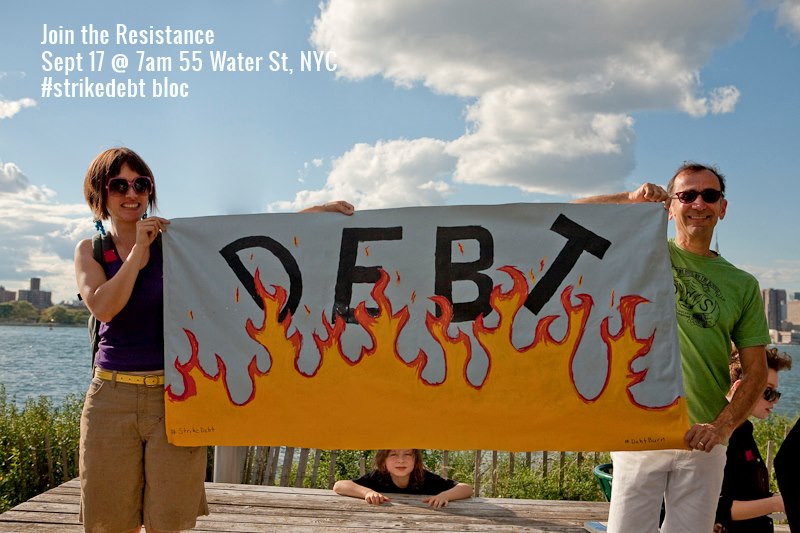A strike debt movement is (in more ways than one) catching fire. In the video below, activists speak about the burdens of crippling debt and burn their billing statements.
When I visited the referenced website this morning, they were still moving material over from another website. I see, however, this Occupy Wall Street link for a July event in Washington Square Park. I also see a Facebook page here (I don't know if it's the same group from the video).
Find them on twitter at #strikedebt. (See photo below - looks like something is planned for S17 in N.Y.C.) Some are adopting the characteristic red felt born of the student strikes in Quebec (posted below on this American blog) -- and whether you're speaking specifically about student debt -- as there are presently many types of debt in our society.
From The Nation:
“Debt is the tie that binds the 99 percent,” Occupy organizer Yates McKee has written: from the underwater and foreclosed-upon homeowners who were first pummeled by the economic crisis, to the millions of debt-strapped students who are in default or on the brink, to all those driven into bankruptcy by medical bills, to workers everywhere who have been forced to compensate for more than thirty years of stagnating wages with credit card debt, to the firefighters and teachers who have had to accept pay cuts because their cities are broke, to the citizens of countries where schools and hospitals are being closed to pay back foreign bondholders. Given the way debt operates at the municipal and national levels, the issue affects us all—even those who are fortunate enough to be debt-free, as well as those so poor they don’t have access to credit. Debt is one of the ways we all feel Wall Street’s influence most intimately, whether it’s because of a ballooning mortgage payment or a subway fare hike or a shuttered clinic.
The protesters state that they are not talking about a debtors' movement, but a debt resistance movement including all of these described sectors of our debt burdened society. Nation writer Astra Taylor observes that, since Occupy Wall Street's inception, debt has been "a kind of subterranean theme of the movement," and --
What’s surprising, then, is that debt hasn’t been made more of a central issue of Occupy organizing until now. Though the Occupy Student Debt Campaign has done some important work (particularly around what it called 1T Day, when student loan debt hit $1 trillion), the issue took center stage only after a series of small Occupy Theory assemblies that were held once a week beginning in May in Washington Square Park, attended by some of the same people who were at the Tompkins Square Park gatherings that planned the initial occupation. A few weeks in, the group found its focus; on June 10, during the inaugural NYC Debtors’ Assembly, there was a palpable spark. People testified through a cardboard “debtors’ mic” for more than two hours, many noting that they had never spoken publicly about their burden before. A deeply personal issue—one that is often a source of private shame—was being politicized before everyone’s eyes. The epiphany that suddenly connects the individual to the collective speaks to one of Strike Debt’s best slogans: “You are not a loan."
I've never "officially recommended" reading an article before, on this blog, but I highly recommend reading that one, along with readers' comments applauding debt resistance activists for, what one poster aptly calls, "finally hitting the nail on the head" after watching organizers go down one "dead end" path after another. Yep, right on the money honey, this time.

No comments:
Post a Comment